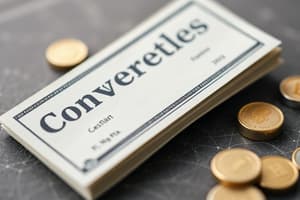Podcast
Questions and Answers
What is the primary consideration for a printer's demand for immediate payment?
What is the primary consideration for a printer's demand for immediate payment?
- Meeting strict regulatory requirements
- Good business practice (correct)
- Maximizing profit margins
- Personal relationships with the business
What type of creditors require a more formalized credit relationship?
What type of creditors require a more formalized credit relationship?
- Banks and asset lenders
- Factoring companies
- Family and friends
- Institutional creditors (correct)
What is a key factor that affects the cost of financing for a business?
What is a key factor that affects the cost of financing for a business?
- The level of risk taken by the creditor (correct)
- The business's industry
- The entrepreneur's personal credit score
- The size of the business
Which type of institutional creditor is generally least willing to take credit risk?
Which type of institutional creditor is generally least willing to take credit risk?
What influences a bank's willingness to take on credit risk over time?
What influences a bank's willingness to take on credit risk over time?
How would you describe the range of risk-taking for all banks during a given economic climate?
How would you describe the range of risk-taking for all banks during a given economic climate?
What is the primary characteristic that distinguishes short-term debt from long-term debt?
What is the primary characteristic that distinguishes short-term debt from long-term debt?
What is the term for debt that arises from credit extended by suppliers and other vendors?
What is the term for debt that arises from credit extended by suppliers and other vendors?
What is the primary reason why a supplier may not extend credit to a new business owner?
What is the primary reason why a supplier may not extend credit to a new business owner?
What is an example of short-term debt?
What is an example of short-term debt?
Why may a business owner need to establish creditworthiness with a supplier?
Why may a business owner need to establish creditworthiness with a supplier?
What is the primary benefit of using trade credit for a business?
What is the primary benefit of using trade credit for a business?
What type of debt is typically used to finance payroll expenses?
What type of debt is typically used to finance payroll expenses?
What is the primary distinction between short-term debt and long-term debt?
What is the primary distinction between short-term debt and long-term debt?
Study Notes
Debt Classification
- Accountants recognize two basic categories of debt or liabilities: short-term and long-term.
- Short-term debt is expected to be paid within one year, while long-term debt exceeds one year.
Short-Term Debt
- Examples of short-term debt include:
- Outstanding invoices from suppliers
- Wages payable to employees between paydays
- Lines of credit from banks
- Payroll taxes due within a few days after payroll
Trade Credit
- Trade credit is the most common type of debt used by entrepreneurs.
- It arises from credit extended by suppliers and vendors.
- Example: Delayed payment for business cards from a local printer.
Institutional Creditors
- Institutional creditors require a more formalized credit relationship.
- Examples of short-term debt sources to manage cash flow:
- Banks
- Asset lenders
- Factors
- Each type of creditor takes differing levels of risk, affecting the cost of financing.
- Entrepreneurs should use the lowest-cost creditor possible based on business risk.
Banks
- Banks are the institutional creditors least willing to take credit risk, even on short-term lending.
- They face strict regulation and must meet demanding credit standards imposed by federal regulators.
- Banks' risk-taking is conservative and based on the overall strength of the economy.
Studying That Suits You
Use AI to generate personalized quizzes and flashcards to suit your learning preferences.
Description
Learn about the two basic categories of debt or liabilities: short-term and long-term, and understand the characteristics of each type. This chapter provides an overview of various types of debt and their repayment timings.




